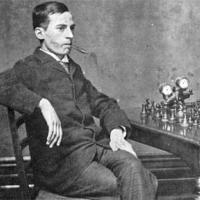In the previous instalments of this column we already discussed the importance of the knowledge of classical games and ideas. Today I'd like to discuss how to generate your own ideas. Again, sometimes it just means using somebody else's ideas.  Or, like Oscar Wilde eloquently put it: " Talent borrows, genius steals".
Or, like Oscar Wilde eloquently put it: " Talent borrows, genius steals".
Let's consider the famous "Pillsbury Attack". The American genius won countless games using a very straightforward approach: finish development, put his Knight on the central e5 square. Then use this Knight, supported by the d4 and f4 pawns as the starting point of a direct attack against his opponent's King.
Just look at the next games, all of them won by a crushing King's side attack:
(Just like in most of my articles I give you a chance to test your chess skills, so the games are given as a Quiz. Please remember that you can always replay the whole game from the first move if you click "Solution" and then "Move list".)
In the next game Pillsbury's opponent tried to bail out by a pawn sacrifice to avoid an attack, but White's powerful centralization quickly decided the game:
So, how did Harry Nelson Pillsbury discover his legendary attack? Of course I can only speculate here, but I strongly suspect that he either saw the Steinitz-Mongredien game (which we analyzed here: http://www.chess.com/article/view/classical-games-everybody-should-know-part-7 ) or he saw the Zukertort games from London 1883 (which we discussed here: http://www.chess.com/article/view/classical-games-everybody-should-know-part-9 ) or, most probably he saw all the above-mentioned games. Then he just applied the ideas that he learned in those games towards a popular line of the Queen's gambit. I can already hear the voices of offended Pillsbury fans insisting that one of the biggest geniuses in the history of chess was well capable of finding this idea on his own. Of course he was. And yet, I am almost 100% sure that Pillsbury knew the above-mentioned games. My reasoning is pretty simple. Unlike these days, when we have hundreds of GM games played almost every week, in the end of the 1800's they probably had
about 50-70 games per year worthy of analysis. I am sure all top chess players thoroughly analyzed such games played by the World's best players. Therefore, I cannot imagine Pillsbury missing the Steinitz or Zukertort games.
But truthfully speaking, we shouldn't care that much how Pillsbury came up with his brilliant idea. What really matters is that this dangerous attack should be in the arsenal of every chess player. Just look what happened in the game played by two modern GMs. I'm sure Pillsbury himself would be proud of White's treatment of his brainchild:
I hope the knowledge of the classical ideas from the past will help you to come up with your own brilliant ideas.
Good luck!

 Or, like Oscar Wilde eloquently put it: " Talent borrows, genius steals".
Or, like Oscar Wilde eloquently put it: " Talent borrows, genius steals". 





